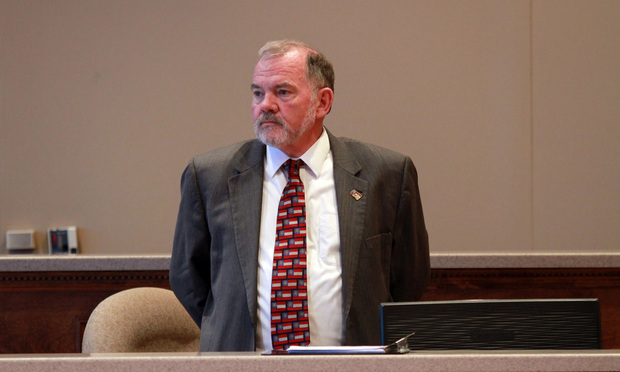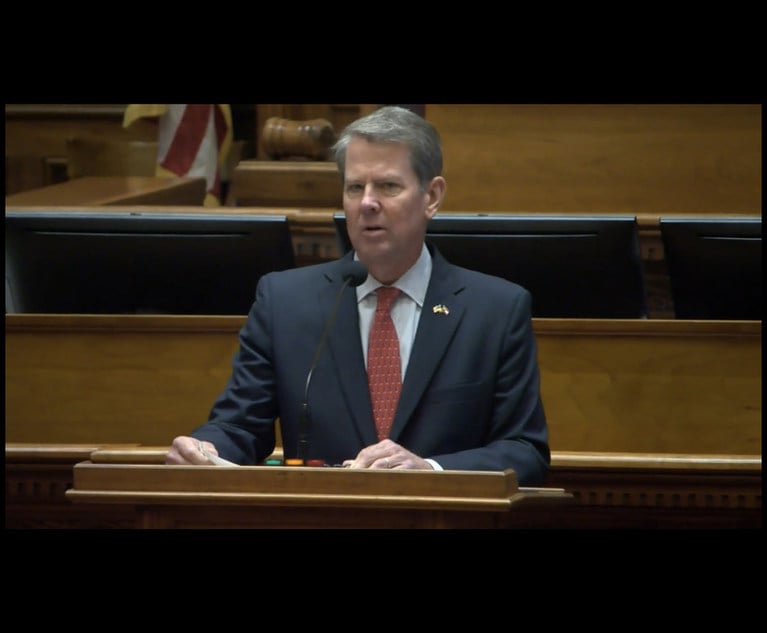Former Governor Tells Appeals Court That Judicial Watchdog Appointees Are Illegal
The case is critical to Griffin Circuit Superior Court Judge Robert "Mack" Crawford's future on the bench after a JQC panel recommended he be removed from office for multiple violations of the ethics code.
January 09, 2020 at 06:34 PM
4 minute read
 Judge Robert "Mack" Crawford, Superior Court, Pike County. At his JQC hearing Feb. 25, 2019. Photo: John Disney/ALM
Judge Robert "Mack" Crawford, Superior Court, Pike County. At his JQC hearing Feb. 25, 2019. Photo: John Disney/ALM
A former Georgia governor told the Georgia Court of Appeals that members of the state's judicial watchdog agency are illegally holding office.
Former Gov. Roy Barnes challenged the legitimacy of the members of the state Judicial Qualifications Commission—which enforces the state Judicial Code of Ethics—arguing the commission's 2018 appointments are invalid because they weren't submitted to the Senate for confirmation until after the legal deadline.
Barnes argued the appeal on behalf of suspended Griffin Circuit Superior Court Judge Robert "Mack" Crawford. The appeal is critical to Crawford's future on the bench after a JQC panel recommended he be removed from office for multiple violations of the ethics code.
Crawford—a former state legislator and former director of the state Public Defender Council—is currently awaiting trial on felony theft charges and violating his oath of office.
If the 2018 appointments are deemed invalid, then the commissioners had no legal authority to bring ethics charges against Crawford or suspend him from the bench.
The Supreme Court of Georgia stayed its decision on whether to accept the JQC's recommendation until Crawford's appeal is handled.
"A law says what it means and means what it says," Barnes argued before Judges Clyde Reese, Carla Wong McMillian and Todd Markle on Thursday. The statute at issue requires that names of JQC appointees "shall be submitted" to the Senate no later than the third Monday in January in order to be eligible for confirmation, he said.
Barnes argues the JQC appointments at issue weren't submitted to the Senate until Jan. 18, 2018—three days after the legal deadline. The former governor referenced the Senate Journal citing the Jan. 18 date as incontrovertible evidence of his claim. The state Constitution has established the journal as "the sole, official record" of Senate proceedings, Barnes said.
"So if the statute means what it says and says what it means, then those who are serving could not lawfully serve on the Judicial Qualifications Commission," Barnes said.
Barnes is seeking to overturn the ruling of a Cobb County Superior Court judge who last year affirmed the legality of the JQC appointments after the commission brought ethics charges against Crawford, suspended him with pay, and then convened a hearing to consider whether additional disciplinary action was warranted.
But JQC director Chuck Boring defended the legality of the judicial watchdog agency's 2018 appointments. Boring said the Senate Journal entry on Jan. 18, 2018, stated that the JQC appointees' names had already been properly submitted when the entry was made. "If you look at the record, the actual memo in the Senate Journal, it doesn't say the names were submitted that day," he argued. "It says, 'They have been submitted.' If it says what it means and means what it says, they have been submitted."
State statute also places responsibility for the timeliness of the submissions on the appointing authorities, he said. "That was key. … The main crux was the action by the appointing authorities, not what the Senate did later." All of the appointees' names were submitted on or before Jan. 14, 2018, he said.
Boring also argued that while the state Constitution mandates that certain legislative actions must be recorded, there is no requirement that JQC confirmations are among them. And he contended that the Senate secretary is a constitutional officer designated to receive documents intended for the Senate. Otherwise, appointing officials would have to appear personally in the Senate to hand out notification of nominations "like kids handing out Valentine's Day cards."
"I'm not saying you have to go in and hand out Valentine's Day cards," Barnes responded after Boring ended his presentation. "You can send it to the lieutenant governor or the [Senate] clerk, although that's not the way I did it. However, it's not presented to the Senate until it appears on the Journal."
Additional Reading:
Supreme Court Stays Removal of Indicted Judge Mack Crawford
Suspended Judge Challenges Watchdog Agency's Recommendation To Remove Him
Judge Affirms Legality of Judicial Watchdog Agency Appointments
Suspended Judge's Counsel Contends Judicial Watchdog Appointments Are Illegal
Judicial Watchdog Recommends Removal of Judge Robert "Mack" Crawford
This content has been archived. It is available through our partners, LexisNexis® and Bloomberg Law.
To view this content, please continue to their sites.
Not a Lexis Subscriber?
Subscribe Now
Not a Bloomberg Law Subscriber?
Subscribe Now
NOT FOR REPRINT
© 2025 ALM Global, LLC, All Rights Reserved. Request academic re-use from www.copyright.com. All other uses, submit a request to [email protected]. For more information visit Asset & Logo Licensing.
You Might Like
View All
Georgia Republicans Push to Limit Lawsuits. But Would That Keep Insurance Rates From Rising?
5 minute read
A Plan Is Brewing to Limit Big-Dollar Suits in Georgia—and Lawyers Have Mixed Feelings
10 minute read
Panel to Decide if Governor Should Suspend Georgia Lawyer From Elected Post
4 minute readLaw Firms Mentioned
Trending Stories
- 1Legaltech Rundown: McDermott Will & Emery Invests $10 million in The LegalTech Fund, LexisNexis Releases Conversational Search for Nexis+ AI, and More
- 2The TikTokification of the Courtroom
- 3New Jersey’s Arbitration Appeal Deadline—A Call for Clarity
- 4Law Firms Look to Gen Z for AI Skills, as 'Data Becomes the Oil of Legal'
- 55th Circuit Strikes Down Law Barring Handgun Sales to Adults Under 21
Who Got The Work
J. Brugh Lower of Gibbons has entered an appearance for industrial equipment supplier Devco Corporation in a pending trademark infringement lawsuit. The suit, accusing the defendant of selling knock-off Graco products, was filed Dec. 18 in New Jersey District Court by Rivkin Radler on behalf of Graco Inc. and Graco Minnesota. The case, assigned to U.S. District Judge Zahid N. Quraishi, is 3:24-cv-11294, Graco Inc. et al v. Devco Corporation.
Who Got The Work
Rebecca Maller-Stein and Kent A. Yalowitz of Arnold & Porter Kaye Scholer have entered their appearances for Hanaco Venture Capital and its executives, Lior Prosor and David Frankel, in a pending securities lawsuit. The action, filed on Dec. 24 in New York Southern District Court by Zell, Aron & Co. on behalf of Goldeneye Advisors, accuses the defendants of negligently and fraudulently managing the plaintiff's $1 million investment. The case, assigned to U.S. District Judge Vernon S. Broderick, is 1:24-cv-09918, Goldeneye Advisors, LLC v. Hanaco Venture Capital, Ltd. et al.
Who Got The Work
Attorneys from A&O Shearman has stepped in as defense counsel for Toronto-Dominion Bank and other defendants in a pending securities class action. The suit, filed Dec. 11 in New York Southern District Court by Bleichmar Fonti & Auld, accuses the defendants of concealing the bank's 'pervasive' deficiencies in regards to its compliance with the Bank Secrecy Act and the quality of its anti-money laundering controls. The case, assigned to U.S. District Judge Arun Subramanian, is 1:24-cv-09445, Gonzalez v. The Toronto-Dominion Bank et al.
Who Got The Work
Crown Castle International, a Pennsylvania company providing shared communications infrastructure, has turned to Luke D. Wolf of Gordon Rees Scully Mansukhani to fend off a pending breach-of-contract lawsuit. The court action, filed Nov. 25 in Michigan Eastern District Court by Hooper Hathaway PC on behalf of The Town Residences LLC, accuses Crown Castle of failing to transfer approximately $30,000 in utility payments from T-Mobile in breach of a roof-top lease and assignment agreement. The case, assigned to U.S. District Judge Susan K. Declercq, is 2:24-cv-13131, The Town Residences LLC v. T-Mobile US, Inc. et al.
Who Got The Work
Wilfred P. Coronato and Daniel M. Schwartz of McCarter & English have stepped in as defense counsel to Electrolux Home Products Inc. in a pending product liability lawsuit. The court action, filed Nov. 26 in New York Eastern District Court by Poulos Lopiccolo PC and Nagel Rice LLP on behalf of David Stern, alleges that the defendant's refrigerators’ drawers and shelving repeatedly break and fall apart within months after purchase. The case, assigned to U.S. District Judge Joan M. Azrack, is 2:24-cv-08204, Stern v. Electrolux Home Products, Inc.
Featured Firms
Law Offices of Gary Martin Hays & Associates, P.C.
(470) 294-1674
Law Offices of Mark E. Salomone
(857) 444-6468
Smith & Hassler
(713) 739-1250







